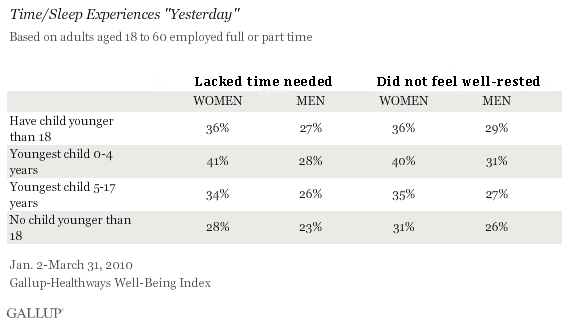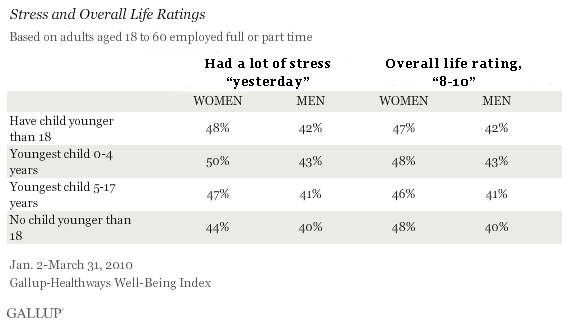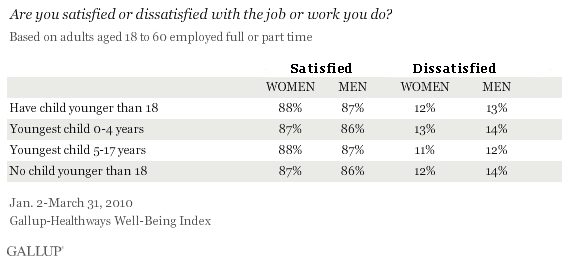PRINCETON, NJ -- Among U.S. workers aged 18 to 60, women with children younger than 18 at home are more likely than men with children at home and women without children at home to say they lack the time and rest they need. Time and rest deficits are most common among mothers of young children.

Key findings:
-
Of working mothers with children younger than age five, 41% told Gallup they didn't have enough time to do what they needed to do "yesterday," compared with 34% of working mothers with older children and 28% of working women with no children younger than 18.
-
No more than 28% of working men, regardless of their parental status, said they were short on time. In fact, the percentage of working men with young children who report lacking time and rest is identical to that among women without children.
-
Working mothers are five percentage points more likely than working women without minor-aged children to say they do not feel well-rested (36% vs. 31%).
-
The lack of rest gap increases to nine points when comparing working mothers of infants and toddlers to working women without minor children (40% vs. 31%).
"Perhaps speaking to their coping skills, working mothers are slightly more likely than other workers to say they experienced a lot of stress 'yesterday'."
These findings are based on more than 27,000 interviews with Americans aged 18 to 60 from January through March 2010, conducted as part of the Gallup-Healthways Well-Being Index. The sample includes 8,972 working women, and 3,940 working women with minor children in the household.
According to Gallup polling, nearly half of the U.S. adult workforce aged 60 and younger is composed of women, and approximately half of these women have a minor-aged child at home. Seventeen percent have an infant or toddler.
Working Women Coping Despite Time Pressures
Perhaps speaking to their coping skills, working mothers are slightly more likely than other workers to say they experienced a lot of stress "yesterday." Additionally, they are as likely as working women without children to rate their current lives as 8, 9, or 10 on a 10-point life satisfaction scale.
Working women, in general, are slightly more positive about their lives than are working men.

Additionally, working mothers express high satisfaction with their paid job (88%). This is comparable to the satisfaction rates seen among working women without children, and it is similar to working men's rates regardless of their parental status.

Bottom Line
Working mothers -- and particularly mothers of young children -- report more difficulty getting the time and rest they need than do other working women and men. While that's not an enviable position to be in, these mothers appear to manage their lives (or, perhaps their expectations) well enough to keep their stress levels roughly in line with their coworkers. And, when they add up the pluses and minuses, working mothers are as likely as others to be highly positive about their life overall.
Learn more about the Gallup-Healthways Well-Being Index.
Survey Methods
Results are based on telephone interviews with 27,016 national adults, aged 18 to 60, conducted Jan. 2-March 31, 2010, as part of Gallup-Healthways Well-Being Index Daily tracking. The aggregated data set includes interviews with 8,972 women who work full or part time, and 11,311 working men. The subsample sizes for working women with children are 3,940 for all working women with a child under 18, 1,206 for those whose youngest child is up to four years old, 2,720 for those whose youngest child is between 5 and 17 years.
For results based on the total sample of working mothers, one can say with 95% confidence that the maximum margin of sampling error is ±2 percentage points. Results based on smaller samples will have higher associated margins of error.
Interviews are conducted with respondents on landline telephones and cellular phones.
In addition to sampling error, question wording and practical difficulties in conducting surveys can introduce error or bias into the findings of public opinion polls.
About the Gallup-Healthways Well-Being Index™
The Gallup-Healthways Well-Being Index measures the daily pulse of U.S. wellbeing and provides best-in-class solutions for a healthier world. To learn more, please visit well-beingindex.com.
